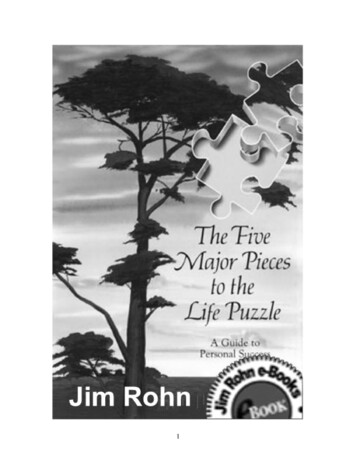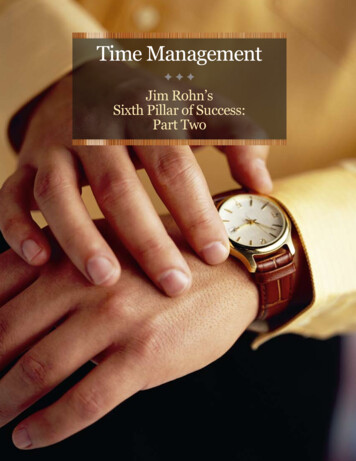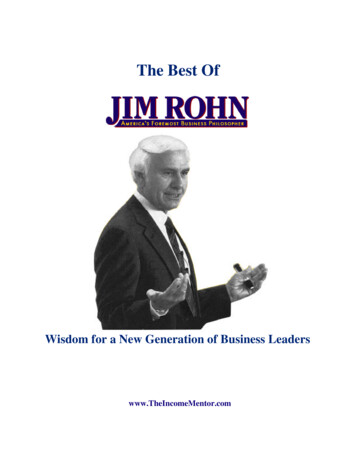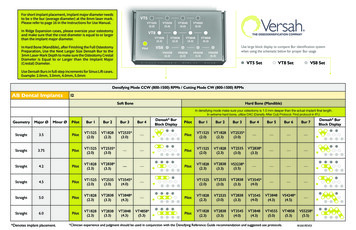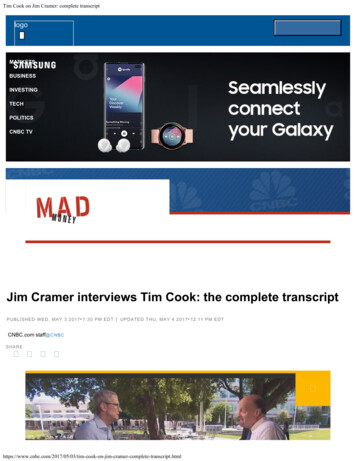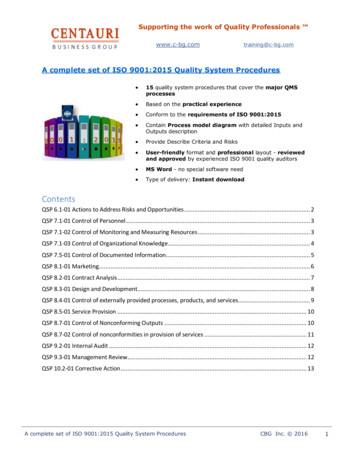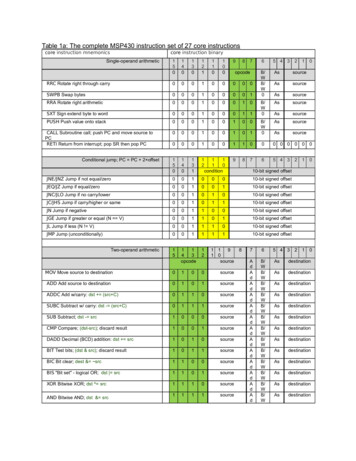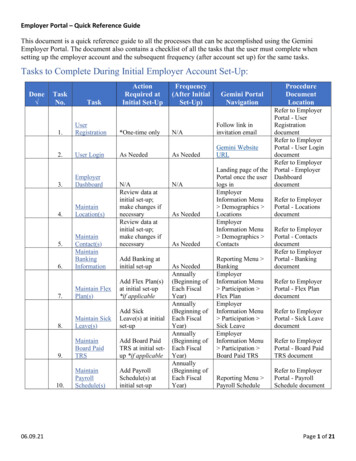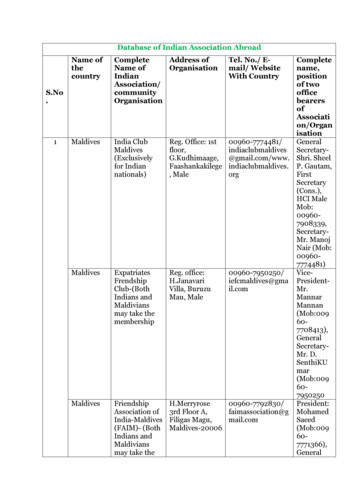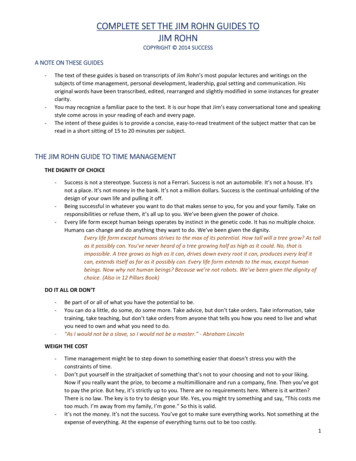
Transcription
COMPLETE SET THE JIM ROHN GUIDES TOJIM ROHNCOPYRIGHT 2014 SUCCESSA NOTE ON THESE GUIDES‐‐‐The text of these guides is based on transcripts of Jim Rohn’s most popular lectures and writings on thesubjects of time management, personal development, leadership, goal setting and communication. Hisoriginal words have been transcribed, edited, rearranged and slightly modified in some instances for greaterclarity.You may recognize a familiar pace to the text. It is our hope that Jim’s easy conversational tone and speakingstyle come across in your reading of each and every page.The intent of these guides is to provide a concise, easy‐to‐read treatment of the subject matter that can beread in a short sitting of 15 to 20 minutes per subject.THE JIM ROHN GUIDE TO TIME MANAGEMENTTHE DIGNITY OF CHOICE‐‐‐Success is not a stereotype. Success is not a Ferrari. Success is not an automobile. It’s not a house. It’snot a place. It’s not money in the bank. It’s not a million dollars. Success is the continual unfolding of thedesign of your own life and pulling it off.Being successful in whatever you want to do that makes sense to you, for you and your family. Take onresponsibilities or refuse them, it’s all up to you. We’ve been given the power of choice.Every life form except human beings operates by instinct in the genetic code. It has no multiple choice.Humans can change and do anything they want to do. We’ve been given the dignity.Every life form except humans strives to the max of its potential. How tall will a tree grow? As tallas it possibly can. You’ve never heard of a tree growing half as high as it could. No, that isimpossible. A tree grows as high as it can, drives down every root it can, produces every leaf itcan, extends itself as far as it possibly can. Every life form extends to the max, except humanbeings. Now why not human beings? Because we’re not robots. We’ve been given the dignity ofchoice. (Also in 12 Pillars Book)DO IT ALL OR DON’T‐‐‐Be part of or all of what you have the potential to be.You can do a little, do some, do some more. Take advice, but don’t take orders. Take information, taketraining, take teaching, but don’t take orders from anyone that tells you how you need to live and whatyou need to own and what you need to do.“As I would not be a slave, so I would not be a master.” ‐ Abraham LincolnWEIGH THE COST‐‐‐Time management might be to step down to something easier that doesn’t stress you with theconstraints of time.Don’t put yourself in the straitjacket of something that’s not to your choosing and not to your liking.Now if you really want the prize, to become a multimillionaire and run a company, fine. Then you’ve gotto pay the price. But hey, it’s strictly up to you. There are no requirements here. Where is it written?There is no law. The key is to try to design your life. Yes, you might try something and say, “This costs metoo much. I’m away from my family, I’m gone.” So this is valid.It’s not the money. It’s not the success. You’ve got to make sure everything works. Not something at theexpense of everything. At the expense of everything turns out to be too costly.1
BALANCING ACT‐‐‐Life at its best and most fulfilled, I think, is a balancing act to make everything work.It’s a challenge to try to fit, compromise, make it work, make all systems work so you don’t sacrificeeverything for something.Make yourself more valuable. Get more from yourself so that you become much more accomplished inan hour that used to take a week. That is the easiest of time managementMAJOR VS. MINOR‐‐‐‐Here’s a key phrase: Either you run the day or it runs you. Getting in charge, mastering the situation, thisis the big challenge.It’s not the hours you put in; it’s what you put in the hours that count. Don’t mistake movement forachievement. Busy, busy, busy, that may not be the deal. It’s the doing what that’s the deal. Somepeople are busy all day long doing figure eights. They’re not making much forward progress.Here are some time management essentials: Learn to separate majors and minors.Here’s what we teach in sales: the most important time in a salesperson’s career is time in the presenceof the prospect ‐‐ that’s called major time.Here’s minor time—on the way to the prospect. Thinking about prospects and how it’s going to go in thefuture, that’s called minor time.You’ve just got to arrange your career so that most often you’re in the presence of. Not on the way to,not keeping books on, not thinking about, and not making records for. Make sure you don’t spend majortime on minor things.CONCENTRATION‐‐‐‐Many times it takes a lot less time when you concentrate. If you get distracted, it takes a whole daybecause of the distraction. But if you concentrate, it could take an hour instead of a day.“Wherever you are, be there.” – from Reader’s DigestDon’t start the day till you get to the work. On the way, enjoy the way. At breakfast, enjoy the breakfast.Some guys in business, they’re already at the office at the breakfast table.Learn to say no. Do you say yes, yes, yes, yes? Then you find yourself so overloaded on your calendarthat it eats up all the time. Learn to say no politely. It’s easier to say, “I don’t think so, but if that changesI’ll call,” than to say, “Oh, yes,” and then try to figure out ways to make the call and not to make it.“Don’t let your mouth overload your back.”WHEN YOU WORK, WORK‐‐‐‐When you work, work. When you play, play. Don’t mix the two.Work is too serious. Economics is a serious business. Economics is a serious subject because you’retrading part of your life being economically sustained and providing protection for you and your familyfor generations to come.Establish that reputation that you don’t fool around at work. You’ve got to consider work like the farmerin the spring. He can’t play around. He’s only got a short season.Develop that reputation not just for other people but for yourself, for your own self‐esteem, that sayswhen you work, you work.ANALYZE YOURSELF‐‐Analyze how you are and see if you can at least be covered. If you’re not good at something, then getsomebody to take care of it instead of delaying all of the time doing it yourself.Either you do it or you can let somebody cover for you and get it done so that you can concentrate onmore essential, more important things.BEWARE OF THE PHONE2
‐With all the new stuff now, here’s what you’ve got to do at home—you’ve got to shut everything off andhave dinner with your family. You just shut everything off. Now they’ve got it where the messages willbe taken and everything will be taken, but you’ve just got to say this time, we shut out the world. Itdoesn’t matter if the president calls. It doesn’t matter who calls. They’ve got to wait for at least an hourtill I’m finished with my family. Your family will take great delight in you shutting out the world.READ THE BOOKS‐Here’s another key on time management. Read the books. If you need some specific help, there’s a bookfor it.THINK ON PAPER‐‐‐Learn to think on paper. You solve problems on paper.Keep a journal.I used to keep notes on pieces of paper, torn off corners, backs of old envelopes, restaurantplacemats thrown in a drawer. Guess what? They didn’t serve me well.Start keeping more records of ideas that come your way, whether it’s a recipe or a colossal business ideaor the schedule for the next few ball games that are coming up. It doesn’t matter what. Just load stuff inthere and then load up another one and load up another one. You will be proud someday that you keptthese journals.PROJECTS BOOK‐‐Whatever project you’re working on, get a three‐ring binder and keep little notes on that project andhow it’s going. When you finish the project, you file it somewhere.If you’re working with a person, you record that person’s name and just keep a little running account ofhow it’s going between you and the person. If you’re in sales, you’ve got some salespeople in there tokeep track of. Give them each a page. Give them each a partition in your projects book. When you’reabout to speak to them, do a little review of what you talked about last time.A FINAL THOUGHT‐‐It’s an obvious—yet often overlooked—truth: rich people have 24 hours a day and poor people have 24hours a day. The difference between the rich and the poor is in the management of that time.Successful people often work harder and longer than most, but they almost always work smarter.If we get more from ourselves, if we can make an hour as valuable as 10 hours used to be, we can get asmuch done in a day as we used to get done in a week. Imagine the potential compounding effect ofworking smarter.THE JIM ROHN GUIDE TO PERSONAL DEVELOPMENT‐‐Learn to work harder on yourself than you do on your job. The important question to ask on the job isnot, “What am I getting?” Instead, you should ask, “What am I becoming?” What you become directlyinfluences what you get. Think of it this way: Most of what you have today, you have attracted bybecoming the person you are today.The great axiom of life: To have more than you’ve got, become more than you are.PERSONAL DEVELOPMENT IS NOT AN EASY MATTER‐‐Personal development is a push. It’s a struggle. It’s a challenge. There wouldn’t be any winning without achallenge.Inspiration is fine, but inspiration must lead to discipline. It’s one thing to be motivated, but it’s anotherthing to be motivated sufficiently to take the classes, do the reading, do the repetition, go through it3
over and over, until it becomes part of you. And those are challenges. They’re not easy, but they’rechallenges that if you win and develop and grow, that’s what determines your place, your return, yourequity, the worth you get from the marketplace.THREE PARTS OF PERSONAL DEVELOPMENT1. Spiritual2. Physical‐ Physical well‐being ‐‐ feeling good about yourself physically, so that you stride into the marketplacewith a sense of self‐worth, self‐confidence, having taken care of that end of it. It covers several parts,including good nutrition.‐ Physical appearance. Be skillful enough to take care of your appearance in the marketplace. It has alot to do with your acceptance. A big share of it is how you appear to other people—on the job,performing, company, community.‐ Be conscious of self, but not self‐conscious.3. Mental‐ Stretching your mind, developing good thinking habits, good study habits, pursuing ideas, and tryingto find ways to apply them to human behavior and the marketplace. All of that takes mind‐stretchand mind‐exercise.‐ If you always back away from something that seems a little difficult at first, you leave yourself weak.Don’t be afraid to tackle the heavyweight stuff.LEARN THE OTHER SIDE OF THE ARGUMENT‐‐Whether you’re debating spiritual, political, physical, behavior, whatever it is, don’t be afraid of theother side of the argument. If you’re strong mentally, you can handle it.Give credit to somebody who’s got a good point. Even though you don’t agree with their argument, youmust agree that they came up with a good point.YOUR PERSONAL DEVELOPMENT LIBRARY‐‐‐‐Education is a lifetime process. We keep putting ourselves through the paces to learn.“Standard education gets you standard results.” ‐‐ Mr. ShoaffHe said why not go beyond the standard and the average and the acceptable and become theadvantaged, the extraordinary, or the extra‐capable?Your library needs to be balanced like the pantry in your kitchen. You can’t be strong just on the easystuff. You’ve got to tackle the full range. We should study history, biographies and autobiographies.Study people who have done unique things, both admirable and despicable. We need to be students ofboth.We need the full range of culture: dance, the arts, literature. Then we need books on geography andlanguage. We need to study a bit of law. No matter what you’re going to do in life, we all need a bit offundamentals on law, contracts, what to sign, what not to sign. Almost everything now has legalimplications.FOUR STEPS TO SUCCESS1. Good Ideas‐ Ideas are the life seeds of enterprise. Never cease your quest for knowledge. Finding ideas can be life‐changing. Business ideas, social ideas, personal ideas—nothing is as powerful as an idea whose time hascome.2. Good PlansPlans give birth to ideas. Riches do not come by crossing your fingers and walking through the dayhoping. Riches and wealth come from well‐laid plans.3. The Passing of Time4
You planted in the spring and now the creditors are on you in the summer. We have a tendency to walkout into the field and say, “Grow crop, grow, they’re on me.” But we have to learn to wait. Part ofsuccess is patience. We Americans probably have to learn patience more than any other people on earthin our push‐button society, right?4. Solving ProblemsProblem solving is where enterprise comes from. This is how you build worth and wealth.Neil Armstrong put it fairly simply. He said going to the moon and back was simply a matter ofsolving problems.Problem 1: how to get there.Problem 2: how to get back. That’s simple, right?He said make sure you don’t leave until you’ve solved both problems.Some things are complicated, but if you take it one piece at a time—solve the problems, put it backtogether—you can’t believe the enterprise you can build, the life you can build, the skills you can build.Take it a piece at a time, master it, and then put it back together to solve it.PUT IT ON PAPER‐‐Take a piece of paper and just spend a little time outlining the problem. It helps you to focus. It helpsyou to zero in.When you state the problem to the best of your ability, you just add this one question. Is that all of it.We’re not to dwell on problems but at least you have got to state them. Because you can’t solve themuntil you clearly define them.THREE SIMPLE QUESTIONS1. What Can I Do?Start by developing what we call working papers. Working papers simply are doing your best. You juststart laying out possible solutions. Then go back and analyze these solutions.2. What Can I Read?Sure
THE JIM ROHN GUIDE TO PERSONAL DEVELOPMENT ‐ Learn to work harder on yourself than you do on your job. The important question to ask on the job is not, “What am I getting?” Instead, you should ask, “What am I becoming?” What you become directly influences what you get. Think of it this way: Most of what you have today, you have .
